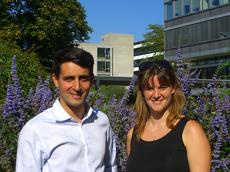A helpful hand to postdocs

Around eighty per cent of scientific staff at ETH Zurich are doctoral students. Some will pursue a career in industry, but a substantial proportion will choose a professional path in academia and most likely move on to postdoctoral positions, however difficult they may be to find.In light of this fact and despite the growing number of postdocs at ETH, AVETH’s (Academic Association of Scientific Staff at ETH Zurich) current representation of them is relatively disappointing and in urgent need of improvement. We must take into consideration that senior scientific staff have different family or professional situations than doctoral students, and thus require a different kind of support. Increasing their numbers within AVETH would be an initial step to ensuring their specific needs are met and concerns heard.
With change and improvement in mind, AVETH recently welcomed Miriam Zimmermann and Maryam Kamgarpour to the organisation to strengthen the support for its post doctorates. Since they arrived from their Ph.D. programmes in the UK and the USA, we have had several fruitful discussions with respect to postdoctoral positions at ETH Zurich. What we’ve learned is that we have some catching up to do and that more emphasis needs to be placed on creating better conditions for our postdocs.
It must be pointed out that there are many advantages to having a postdoctoral position at ETH Zurich. Due to its reputation and the available services and resources, this university is an important steppingstone to pursuing an academic career. As one example, the Human Resources department at ETH offers substantial career management support on an individual level for postdocs and senior scientists. ETH also provides various funding possibilities as part of its strategy to attract new people. However, the number of open professorships and permanent research positions is very limited.
In addition to the insecurity of having to live with 1-2 year renewable contracts, we believe that the low number of fixed professor and research positions discourages people from continuing a career path at ETH. It also means that the postdocs themselves have to put more work and effort into planning thoroughly. Yet, certain things could be restructured to make it easier for postdocs to follow an academic career path at ETH. For example, the split between research and teaching may not be ideal for everybody. What if postdocs were given the opportunity to specialise in one or the other? Not only would the quality of teaching improve, creating this option may allow for more permanent positions as the job would require more focus.
It is clear that AVETH has a role to play in supporting postdocs and senior scientific staff in looking for more secure job situations, improving their employment contracts, setting up their future career path or developing a better childcare system. In fact, AVETH has already started to specify its actions for postdocs in this regard. The first thing we did was organise a seminar about funding opportunities at ETH. This is often an important task that most have not had to deal with during their doctoral studies. The seminar highlights the numerous options available for funding at ETH, in Switzerland or in Europe, and assists them in writing financial proposals.
While the first event was highly successful, our goal is to continue arranging work-related activities as well as career-oriented events. In addition, we think that postdocs will greatly benefit from casual social events. Several get-togethers are already in planning, such as a bi-yearly “Meet the new postdocs apéro” or the wine and cheese-tasting event where newcomers can get to know everyone in a relaxed atmosphere. We want to give postdocs a platform to connect with each other, but more importantly, we want them to use these meetings and activities as an opportunity to express their needs so that we can offer better support.
About Miriam Zimmermann
Miriam Zimmermann studied Biology at the Albert-Ludwigs-Universität Freiburg in Germany with a focus on immunology. Being interested in cancer research, she completed her 4-year Ph.D. at the Institute of Cancer Research near London in the UK. In February 2013, she started a postdoc position in translational cancer research in Wilhelm Krek’s lab at the Institute of Molecular Health Sciences (IMHS) at ETH Zürich. Miriam joined AVETH in June 2013 and is responsible for postdoctoral related matters and events, together with Maryam Kamgarpour.
About Florian Emaury
Florian Emaury obtained his Master of Science in physics in 2010 from the Institute d'Optique Paris Tech (IOGS) near Paris. After one year of working abroad in California, USA, he joined the Ultrafast Laser Physics Group headed by Professor Ursula Keller at the Institute for Quantum Electronics at ETH, where he is currently working on laser developments. Within the framework of AVETH Florian leads the Politics Working Group (PoWoG) since February 2012, whereby he is actively engaged in addressing the issue of foreigner integration at ETH and the topic of employee salaries.







READER COMMENTS